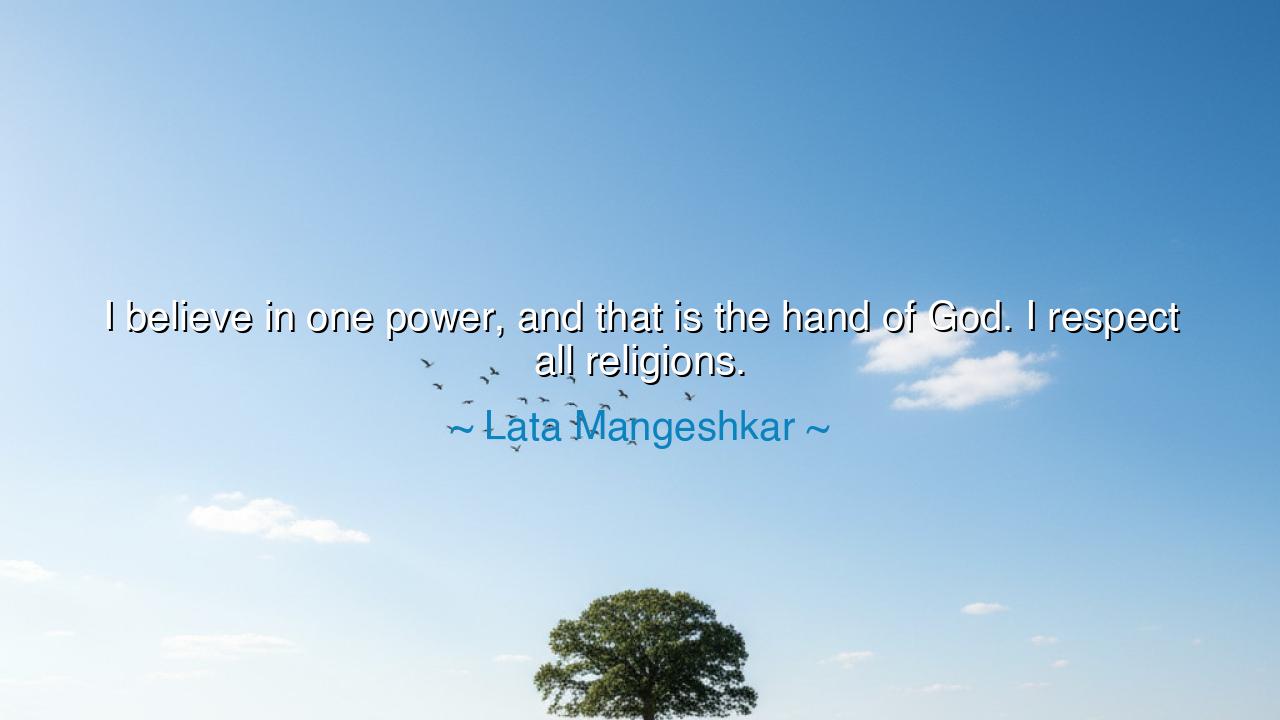
I believe in one power, and that is the hand of God. I respect






In the words of Lata Mangeshkar, "I believe in one power, and that is the hand of God. I respect all religions." These words speak to the universality of faith, transcending the barriers that often divide us. Mangeshkar’s belief in one power—the hand of God—reminds us of the fundamental connection between all forms of spirituality and religion. While the names and rituals may differ, the core principle remains the same: a deep, reverent belief in a higher force that guides and sustains us. Respecting all religions, as Mangeshkar emphasizes, is not merely an act of tolerance, but an acknowledgment of the shared pursuit of truth and goodness that all spiritual paths ultimately seek.
The ancients understood the concept of a higher power that transcended human understanding. In Greek philosophy, Plato spoke of the One, a divine source from which all things emanate. To him, the One was the ultimate reality, beyond the multiplicity of forms and the various deities of the Greek pantheon. Similarly, the ancient Hindus spoke of Brahman, the all-encompassing, formless source of the universe, from which all life and matter arise. Mangeshkar’s words reflect this deep understanding: that at the heart of all religions and philosophies lies a singular, unifying force—the hand of God—that connects us all, regardless of the paths we take to reach it.
Consider the story of Mahatma Gandhi, who embodied this spirit of respect for all religions. Gandhi was deeply influenced by the principles of ahimsa (non-violence) and satya (truth), values that are central to many religious traditions, including Hinduism, Christianity, and Islam. Gandhi often spoke of the unity of all religions, believing that each had its own way of guiding people toward God. His respect for the diversity of spiritual beliefs was not just intellectual, but deeply personal—he sought to live his life in a way that honored the essence of all religions. Just as Mangeshkar's faith in God transcends the boundaries of religion, Gandhi’s life shows that true respect for others is found in recognizing the common truths that unite us all, no matter the external differences in belief.
In the ancient world, respect for the divine and the spiritual practices of others was often seen as a mark of wisdom. The Roman Empire, for instance, was home to a multitude of gods and religious traditions. Despite this polytheistic diversity, the Romans recognized that each religious practice, whether it was Greek, Egyptian, or Persian, had its own validity and power. Respecting these differences allowed the empire to coexist peacefully with a diverse population of believers. The story of Rome reflects the idea that respect for other faiths does not diminish one’s own belief, but rather enriches it, bringing a greater understanding of the unity that exists beneath the surface of religious diversity.
The lesson that Mangeshkar teaches us is that respect for all religions is not just a noble ideal, but a pathway to greater understanding and unity. In a world where division often arises from differing religious beliefs, it is essential to recognize that at the core of every faith lies a common thread: the belief in a higher power, the pursuit of moral goodness, and the desire for spiritual growth. By embracing this truth, we move beyond the boundaries that separate us and step into a place of common ground where we can all respect and honor each other’s paths.
In our own lives, we can take this wisdom to heart by striving to cultivate a spirit of openness and respect toward all religious beliefs. Let us not be quick to judge or dismiss the faiths of others, but instead seek to understand the truth that each belief system carries. Whether we are engaging in conversations with friends, neighbors, or strangers, let us approach these exchanges with a sense of humility and a willingness to listen. By doing so, we honor not just the beliefs of others, but also the shared humanity that unites us all.
Finally, let us reflect on Mangeshkar’s simple yet profound faith in God. In a world that often focuses on the differences between religious ideologies, let us remember that the essence of all religions points toward the same divine truth. Just as Mangeshkar believes in one power, let us strive to see that same divine force in everyone we meet, regardless of their religious beliefs. In this way, we move closer to the unity that all the great ancient philosophers, religious leaders, and thinkers have sought to teach us: that the truth is universal, and we are all part of the same divine plan.






AAdministratorAdministrator
Welcome, honored guests. Please leave a comment, we will respond soon